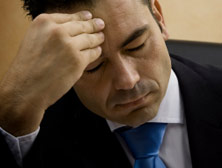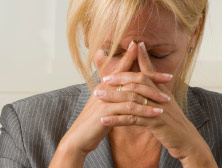MigraineHelper.com
 |
 |
 |
 |
|
Taking Charge of Headache PainTaking Back Your Power
As time goes on, more and more people are deciding to take charge of their own health and are becoming proactive when it comes to treatment for a variety of different ailments. This action includes the treatment for migraine headaches. By changing their approach to migraine treatment, many people are able to take charge and make changes - lessening or even eliminating the occurrence of migraine headaches in their lives. You Want Me To Give Up My Meds?
When it comes to making changes, especially where pain is concerned, many of us become very afraid. We don't want the pain to show up and, at the same time, there's a fear that the medications we're taking won't do the job. If we think about eliminating the medications, panic sets in. The thought of being bedridden with a migraine is more than incomprehensible and why, if it can be controlled even a little with pain killers, would you want to allow the pain? If the recurring pain of headaches is frustrating you, then Dr. David Buchholz suggests that the way you're dealing with them isn't working and a different approach should be considered. What Causes Headaches
Headaches arise from a single mechanism in the brain - although they can be triggered by many different stimuli. According to Dr. Buchholz, the brain has a control center where triggers pile up and, depending upon your genetic make-up and hereditary factors, the tolerance load for headache triggers may be high or low. As long as the load you are gathering stays below the threshold of your particular genetic make-up, then you should be able to control the headaches. If, however, the load rises above the threshold, then a headache ensues and you're in pain. Be Strong and Avoid Quick Fixes
He recommends avoiding the quick fix, which can cause rebounds. By relying upon pain killers for relief, the end result will be that the headaches will be worse than if you aren't using medication at all. Many of the prescription drugs used today to address migraine headaches, have a rebound effect. That means that if you take the drug too often your threshold lowers and the tendency toward a headache increases. As most of us know, when we use a drug too often we soon require more and higher doses to deal with the issue because our bodies build a resistance to it. Breaking the Cycle, Curbing the Triggers
Dr. Buchholz says that the way to avoid rebounding with drugs is to stop the dependence upon them. By limiting intake to two days per month, the rebound effect will be avoided. If you are already in a rebound with drugs, then Dr. Buchholz recommends withdrawing from them completely to break the cycle. This can be very difficult and frightening as the prospect of pain without relief looms large before your eyes. OTCs such as aspirin, acetaminophen without caffeine, anti-inflammatories and nausea medications are less inclined to create rebound but should be taken no more than twice a week. In his book, "Heal Your Headache: The 1-2-3 Program for Taking charge of Your Pain," Dr. Buchholz goes into great detail about drug use, dietary triggers and preventing headaches. It isn't a quick fix, and it may be unpleasant at first, but he assures his readers that there is help, hope and life beyond headaches.
|
n |